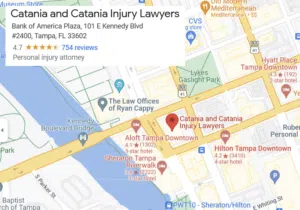
A personal injury lawyer can lend experience and legal knowledge to your case. The lawyer you choose for your case can mean the difference between winning and losing.
But sometimes, a lawyer will turn down your case. This can happen for many reasons. Depending on the circumstances, you might be able to have another lawyer take your case. But in some situations, your case may have a limitation that prevents it from moving forward.
Here are some of the reasons why an injury lawyer might refuse your case.
Table of Contents
A Lawyer May Decline Your Case for Reasons that Relate to the Case
Your case might have issues that cause an injury lawyer to turn it down. You should keep in mind that some of these issues might present obstacles that are difficult, but not impossible to overcome.
The Statute of Limitations Has Run Out
All legal claims expire after a certain length of time has passed. This provides certainty that old claims will not resurface later.
Florida provides a relatively generous four years to file most injury claims. This two-year statute of limitations covers claims arising from:
- Negligence
- Intentional torts like battery
- Product liability
- Statutory torts like dog bites
Under certain circumstances, Florida law tolls the statute of limitations. For example, suppose that the person who injured you disappeared. Florida law pauses the statute of limitations until they return.
If the statute of limitations has run out on your claim and none of the tolling provisions apply, a lawyer will probably refuse your case.
No Cause of Action
To file a lawsuit, you must have a valid claim against the defendant. You cannot bring a lawsuit for every injury. Only injuries that arise from a legal violation provide a cause of action.
A lawyer might refuse your case if no one engaged in negligent or intentional behavior that would justify a lawsuit.
Suppose that you sustained a serious injury in a car accident when you swerved to miss an animal. No one did anything wrong, so you would have no one to sue.
Similarly, suppose that you fall off a ladder at work. Under Florida law, you cannot sue your employer. Instead, the workers’ compensation system would provide your exclusive remedy for medical and wage benefits.
If you have no claim, a lawyer has an ethical duty to turn down your case. If this happens, you should consider getting a second opinion.
Creative lawyers can sometimes find a cause of action where others cannot. For example, if your ladder at work was defective, you might be able to sue the ladder manufacturer.
A Lawyer May Decline Your Case for Reasons Relating to Your Damages
Injury lawyers usually work for a contingent fee. This means that the lawyer takes a share of your settlement or damage award as a fee for their services.
Contingent fees help accident victims who might not otherwise have the resources to hire a lawyer. But lawyers will refuse representation if the damages do not justify the work required.
Contributory Negligence
If your actions contribute to your injuries, a judge can reduce your damages in proportion to your fault.
Suppose that you hit a distracted driver who ran a stoplight. If you were speeding when you collided, a jury could assign partial fault to you. If you bear 15% of the fault, you can only recover 85% of your damages.
In some circumstances, your share of the fault might reduce the damages so much that a lawsuit is fruitless. If you played a large role in the accident that caused your injuries, a lawyer might decline to represent you.
Minimal Damages
Your damages will include your past and future medical bills and lost income. In most cases, your damages can also include compensation for pain and suffering.
Minimal damages lead to a small contingent fee. Lawyers need to cover their expenses and labor to justify working on a case. If the lawyer believes your damages will not earn a fee that properly compensates the firm, the lawyer will turn down your case.
If a lawyer turns down your case due to small damages, get a second opinion. A creative lawyer might find a theory to argue for greater damages.
Judgment-Proof Defendant
In most cases, the lawyer can pursue a defendant’s insurance policy to recover compensation for you. When a defendant has no insurance, the lawyer can pursue the defendant’s assets. But when a defendant has neither insurance nor assets, a lawyer might decline the case.
A Lawyer Might Decline Your Case for Reasons that Relate to the Representation
Lawyers will decline a case when their duties to you or other clients require it. When a lawyer declines a case for these reasons, you can usually find another lawyer who can take it on.
Lack of Experience
Florida’s Rules of Professional Responsibility require lawyers to provide competent representation. If a lawyer lacks experience with the issues in your case, they must turn it down.
A lawyer who turns a case down for lack of experience will usually refer you to another lawyer or law firm that can handle your case competently.
Conflict of Interest
Lawyers cannot represent clients whose interests conflict with the interests of the lawyer or the lawyer’s past or current clients.
Suppose that you slipped and fell in a restaurant. A lawyer who previously represented the restaurant in a contract dispute probably cannot accept your case.
Lack of Availability
Lawyers get busy. But lawyers have an ethical duty to handle all cases diligently. If a lawyer takes on too many cases, the clients’ cases will suffer. When a lawyer has run out of availability, the lawyer will decline new cases.
What to Do After an Injury Lawyer Declines Your Case
If a lawyer declines your case, talk to another lawyer. Most injury lawyers offer free consultations. You can use these consultations to determine whether your case has flaws. If you have a solid case, you will eventually find a lawyer to take it.
To have your case evaluated by an experienced injury lawyer at Catania and Catania Injury Lawyers, contact our Tampa law offices online or call (813) 222-8656. Our skilled attorneys will listen to the facts of your case during a free consultation, helping you to determine your next best steps.




